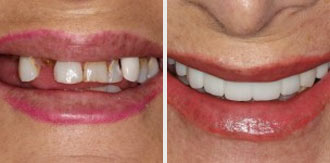TMJ Treatment Offers Relief and Improved Quality of Life
If you suffer from temporomandibular joint disorder (TMD), you may be wondering what treatment will work best for you. For temporomandibular disorders, our Bingham Farms, MI dentist, Dr. Timothy Kosinski, offers various treatment options, both non-surgical and surgical.
To determine the best treatment for you, contact Dr. Kosinski today by calling Smile Creator at 248-646-8651 to schedule a TMJ consultation.
What Are Temporomandibular Joint Disorders?
 Temporomandibular joint disorders (TMJ disorders or TMD) are a group of conditions that affect the temporomandibular joint, which is the joint that connects your jawbone (mandible) to your skull (temporal bone) just in front of your ear. These disorders can cause pain and dysfunction in the jaw joint and the muscles that control jaw movement. TMJ disorders can range from mild to severe and can be temporary or chronic.
Temporomandibular joint disorders (TMJ disorders or TMD) are a group of conditions that affect the temporomandibular joint, which is the joint that connects your jawbone (mandible) to your skull (temporal bone) just in front of your ear. These disorders can cause pain and dysfunction in the jaw joint and the muscles that control jaw movement. TMJ disorders can range from mild to severe and can be temporary or chronic.
Surgical Treatment Options for TMD
Arthrocentesis
Arthrocentesis is a minimally invasive surgical procedure in which a small needle is inserted into the joint space to irrigate the joint and remove any debris or inflammatory substances. This procedure can help reduce pain and improve jaw function. This procedure can be performed on an outpatient basis, and most patients can return to normal activities within a few days of the procedure.
Arthroscopy
Arthroscopy is a minimally invasive surgical procedure that uses a small camera and surgical instruments to diagnose and treat joint problems. During an arthroscopy for TMD, a small incision is made near the joint, and the camera is inserted to view the joint’s interior. This procedure can remove inflamed tissue or repair a torn disc. Your Bingham Farms oral surgeon may also smooth out rough or uneven surfaces, reducing pain and improving jaw movement.
Open Joint Surgery
Open joint surgery is a more invasive surgical option for TMD, during which the jaw joint is opened to allow the surgeon better access to the joint’s interior. This procedure may be necessary for those with severe joint damage, such as advanced osteoarthritis or dislocated discs. Your oral surgeon may remove damaged tissue, repair or replace the disc, or reposition the jaw during the surgery.
Total Joint Replacement
Total joint replacement involves replacing the entire joint with an artificial joint. This option is typically reserved for those with severe joint damage that can’t be repaired through other surgical methods. Your Bingham Farms oral surgeon will remove the damaged joint and replace it with an artificial joint made of metal, plastic, or a combination of both. The artificial joint replicates the natural joint’s movement, allowing for improved jaw function and reduced pain.
When Is Surgery for TMD the Best Option?
When it comes to treating a temporomandibular joint disorder, surgery is usually a last resort after non-surgical options have been exhausted. However, there are situations where surgery for TMD may be the best option. Factors to consider include:
- Severe Joint Damage: If you have significant joint damage, such as advanced osteoarthritis or dislocated discs, surgery may be necessary to repair or replace the damaged tissue.
- Limited Jaw Movement: If TMD is causing limited jaw movement that affects your daily activities, surgery may be the best option to improve jaw function and quality of life, surgery may be necessary to correct the problem.
- Ineffective Non-Surgical Treatments: If you have tried non-surgical treatments, such as medications, physical therapy, and splints without finding relief from TMD symptoms, surgery may be the best option.
- Persistent Pain: Pain that affects your quality of life and isn’t relieved by non-surgical treatments may indicate that surgery is needed.
Non-Surgical Treatment Options
- Diet: Eating a healthy, balanced diet can help reduce inflammation in the body, including inflammation in the jaw muscles and joints that can cause TMJ pain. Some anti-inflammatory foods to include in your diet are leafy greens, berries, nuts, fatty fish, and whole grains. You may try avoiding or limiting processed foods, sugar, and alcohol, as they can increase inflammation in the body and worsen symptoms.
- Stress Management: Stress is a common trigger for TMJ disorders, and it can worsen symptoms. Practicing relaxation techniques such as yoga, meditation, and deep breathing can help reduce stress and promote relaxation. Regular exercise, spending time outdoors, and engaging in hobbies or activities that you enjoy can also help reduce stress levels.
- Sleep: Getting enough sleep can help reduce stress levels and promote relaxation to improve TMD symptoms. Aim to get seven to eight hours of sleep each night and establish a regular sleep schedule by going to bed and waking up at the same time each day. Avoid using electronic devices before bed and create a relaxing bedtime routine, such as taking a warm bath or reading a book, to help prepare your body and mind for sleep.
- Warm and Cold Compresses: Applying a warm compress or cold pack to the affected area can help alleviate TMJ symptoms and reduce inflammation. A warm compress helps increase blood flow and relax the muscles, while a cold compress helps numb the pain and reduce swelling.
Frequently Asked Questions
What causes TMJ to flare up?
What are the risks associated with TMD surgery?
How can I prepare for TMD surgery?
Should my jaw pop when I chew?
Even if you don’t feel pain now, practicing TMJ exercises may help with your jaw popping and may prevent any TMJ issues you have from getting worse. Dr. Kosinski can provide guidance on some of the best practices for TMJ relief.
Start your Journey to a Life Without Jaw Pain
If you’re experiencing symptoms of TMD and have not found relief through non-surgical treatments, it may be time to consider surgical options. Talk to your Bingham Farms dentist, Dr. Kosinski, about whether you may be a good candidate for surgical treatment and what your options are.
Don’t let TMD symptoms continue to impact your daily life – take action and explore your treatment options today. Call Smile Creator today at 248-646-8651 to schedule a consultation.

